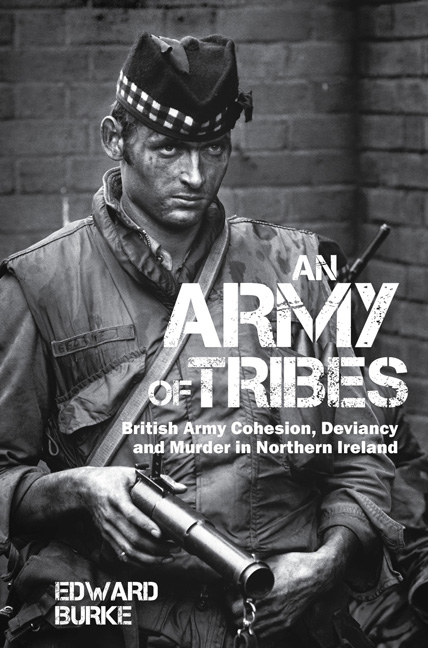Book contents
- Frontmatter
- Contents
- Preface
- Acknowledgements
- List of Abbreviations
- Maps
- Introduction
- 1 The British Army Before 1971
- 2 The Political and Operational Environment in Northern Ireland, 1969–1972
- 3 The Scots Guards and Argyll and Sutherland Highlanders Regiments in Northern Ireland, 1971–1972
- 4 Murder: The Killing of Michael Naan and Andrew Murray
- Conclusion
- Bibliography
- Index
2 - The Political and Operational Environment in Northern Ireland, 1969–1972
- Frontmatter
- Contents
- Preface
- Acknowledgements
- List of Abbreviations
- Maps
- Introduction
- 1 The British Army Before 1971
- 2 The Political and Operational Environment in Northern Ireland, 1969–1972
- 3 The Scots Guards and Argyll and Sutherland Highlanders Regiments in Northern Ireland, 1971–1972
- 4 Murder: The Killing of Michael Naan and Andrew Murray
- Conclusion
- Bibliography
- Index
Summary
Soldiers are frustrated by the politicians’ failure to combat the terrorists with strength. What can you say to one of your men when he asks, ‘Which side are the politicians on sir?’
Civil-Military Relations, Political Aims and Operational Tensions in Northern Ireland, 1971–1972
In 1969, Defence Secretary Denis Healey looked back with satisfaction upon his part in reforming the military for a new, post-imperial era. Healey had cut defence spending by a third since 1964, making savings in the defence budget of £5 billion over five years. He had also brought the Army home; more than half of the UK's 59 infantry battalions now served in the UK, including ten in Northern Ireland on the newly constituted Operation Banner, the essential aim of which was to prevent sectarian rioting during a period of wider political reform in the province. Britain now had a military ‘fit for a different era’. But, within the senior ranks of the Army, a change in location did not mean a shift in values and tactics. In 1969, a police officer who worked closely with the Army, described the military ethos as he knew it:
The basic duty of an infantry soldier is to seek out the enemy and destroy him. From the day he joins he has the offensive spirit drummed into him. ‘Law’, as far as he is concerned, is a matter of army regulations. He is a fighter, and when he strikes he does so with devastating force and preferably without warning … The most narrow-minded type of soldier thinks of guerrillas as a purely military force, and measures success in terms of the ‘bag’ recorded in the Battalion game book.
This chapter contends that it took key senior officers a considerable time to adjust to the operational limitations of war at home in the UK. In Northern Ireland, ‘the offensive spirit’ had to be contained. The enemy was not to be shot on sight, unless he or she was imminently preparing an attack; he or she was to be arrested and tried by civilian courts. Discord between military and civilian leaders and dissent within battalions over the right type of tactics to pursue led to an inconsistent approach by the Army in Northern Ireland.
- Type
- Chapter
- Information
- An Army of TribesBritish Army Cohesion, Deviancy and Murder in Northern Ireland, pp. 63 - 122Publisher: Liverpool University PressPrint publication year: 2018



